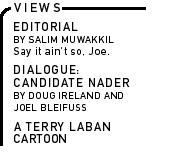 |

|

|

|

|
| |
 |
|
|
For a behind-the-scenes look at this year's Democratic Convention, In These Times turned to Bob Burnett. A longtime social activist in the Bay Area and supporter of the magazine, Burnett is also one of the founders of Cisco Systems. The following is a diary of his trip to Los Angeles. DAY 1: SADDLE UP, PILGRIMS Los Angeles. The Lourdes of the West - where Americans come to bathe in the healing waters of glamour and fame. And here Al Gore will come to accept his party's nomination and (we hope) get a transfusion of energy for his lacerated campaign. Lord, heal this candidate! Please grant him a new personality! (Somebody say, Amen.) I'm here to see if I can find a reason to be enthusiastic about Gore. As this campaign has developed, I have found it increasingly reminiscent of 1968, when we all were so angry at the Democratic Party in general, and Hubert Humphrey in particular (a decent man, strikingly similar to Gore), that we didn't vote (or voted for third party candidates) and got Richard Nixon elected. That again seems an increasingly likely scenario: Many of us will abandon the Democrats, and Dubya (with the campaign of Clinton, the soul of Nixon, and the mind of Quayle) will be elected. So I probably will vote for Gore - unenthusiastically. But I want some reasons beyond abortion and gun control. Maybe, before the week is over, I'll find these reasons. I hope so.
My day starts at a conference on "The Impact of Information Technology on American Democracy" at the Biltmore Hotel. The most interesting panelist, journalist Farai Chideya, points out that the Internet is still the province of the white establishment and asks what we are going to do to close the digital divide. The most unexpected response comes from Gerald Levin (yes, the same Gerry Levin who, as CEO of Time-Warner, engineered the merger with AOL). He says the answer is not merely putting more computers in schools: We actually need to pay teachers more and give them more training. A lot of discussion ensues about how to get young people involved in the political process. They're not tuning in to the parties' Web sites, and there's fear that they find the current political scene dull and irrelevant. Nobody seems to notice that young folks have used the Web to mobilize anti-WTO protests and organize cultural events like the "Burning Man" festival. A lot of brainpower is used trying to come up with an apt assessment of the Internet. They don't get close. araphrasing Chairman Mao, however, Macintosh guru Guy Kawasaki makes a lame attempt: "The Internet will bloom like 1,000 flowers."
Later, I head to the Beverly Hills Hotel for a party thrown by the Democratic Senatorial Campaign Committee and paid for by a clutch of real estate interests. (Full disclosure: My wife Kathy and I were invited to this and other events because we gave money to the DSCC.) The speeches are predictable: We'd be better off with Patrick Leahy than Jesse Helms as chairman of the Foreign Relations Committee. We Democrats are the real reformers. We're responsible for the economic prosperity (the one caused by the Internet revolution; the one that doesn't seem to be reaching half of society - but no one talks about that). Blah blah blah. Afterward, during the schmooze-a-thon, everyone is worried about Gore. Does he have a chance? Will adding Lieberman to the ticket make a difference? DAY 2: A TALE OF TWO CONVENTIONS To get into the Staples Center for the Democratic
Convention, you have to take a special security bus and pass through
three checkpoints and a metal detector before entering the building
(a lot like attending high school in L.A.). A half-mile away at
Arianna Huffington's Shadow Convention, you park across the street
and try to get past the guy handing out Worker's World.
At 5 p.m. the Democratic Convention begins with a parade of prominent women. It segues from senator to senator until Maryland's Barbara Mikulski introduces Hillary Clinton. Her theme is: "I have too done something!" She actually has her own record of accomplishment, she insists, particularly the defense of children. Earlier in the day, I heard author Jonathan Kozol speak of the horrifying conditions in which poor children live. He remarked that the only politician who hadn't lied to him about helping these kids was Paul Wellstone. There was no mention of Hillary. *** A few days ago, I asked some friends in Berkeley if they would vote for Clinton if he were running again. They said they would. ("He may be slime, but he's our slime.") They all believed Clinton could defeat Dubya in the general election. Clinton makes a rock-star entrance into the convention. The picture flashed on the huge TV monitors shows him slowly walking into the arena, while a list of his accomplishments scrolls across the bottom of the screen. ("Economy up 35 consecutive quarters" ... "Teen pregnancy at lowest rate in 30 years" ... Sexual harassment up 42 percent ...) By the time he finishes his interminable stroll through the bowels of the Staples Center, the crowd is near hysteria. Even by Clinton standards his speech is a tour de force. The theme is simple: The Republicans do not understand the economy. They do not understand that "the purpose of prosperity is to grow a community." Al Gore must be elected to extend his legacy. *** After the convention, I attend a party on the Paramount Studios backlot with Kathy and a few thousand intimate friends. The host is California Gov. Gray Davis (motto: "Vote for me or go to prison"). At the end, the governor appears on stage with the Clintons. He presents Bill with his very own "Oscar." And so we say good-bye to Bill. Or do we? How can we miss you if you won't go away? DAY 3: NO CHOICE During the day Kathy and I go to a luncheon hosted by the largest Democratic PAC - Emily's List, which promotes pro-choice female candidates (and of which we've been longtime supporters). There's a certain note of desperation in the speeches. The number of women in Congress has greatly increased in the past eight years (California alone has two women senators and 11 women in Congress). But voters turn out for the top of the ticket. That means if Dubya wins, women will lose. Dianne Feinstein steps onto stage. I'm not a big fan. While we are close to the same age, she has always seemed to come from a different century, the world of Queen Victoria not Queen Latifah. But her speech slowly wins me over. She takes a more personal tone than I've heard before: She describes what it was like in the '50s, when she first entered the work force, and her first political campaigns of the '60s, when female supporters had to get their husband's permission before they could write a check. When she talks of the world before Roe v. Wade, the room gets very still. She recalls a time when her sorority sisters passed the hat because one of them needed an abortion. She remembers women she knew who committed suicide because they were pregnant. My own personal history is pushed in my face. I have agonized over an untimely pregnancy and accompanied a loved one to an abortion clinic. So this election is about choice. Will we continue to fight for equality and women's rights, or will we return to the Dark Ages? *** At the convention we go everywhere by bus - very slowly. But this gives us lots of time to chat with the conventioneers. I'm struck by what good folks they seem to be - maybe not radicals, but each working in their own way for change in their communities. But they don't understand what the protests are about. "What are they so angry about? Why don't they protest against the Republicans?" I enumerate some of the issues being highlighted: globalization, economic inequality, environmental degradation, draconian drug laws. The others on the bus say they too are concerned about these issues. They ask: "Why are they protesting against us?" DAY 4: MONEY TALKS I listen to a presentation about "The Progressive Caucus on the Democratic National Platform" at the Shadow Convention. Hecklers frequently interrupt their presentation, shouting out helpful advice such as: "Leave the Democrats, vote for Nader." It turns out that the Progressive Caucus tried to add four amendments to the platform. They called for providing universal heath care, narrowing the gap between rich and poor (by raising the minimum wage to a living wage), requiring that international treaties provide stronger labor protections, and stopping production on the "Star Wars" missile defense system. Sounds good. When they attempted to present these amendments to the platform committee, of course, they were steamrolled by the Gore folks. There wasn't even any debate. Gloria Allred, a Hispanic political commentator and convention delegate, says the Gore campaign is intent on keeping the convention as vanilla-flavored as possible, only offering up a few carefully chosen facets - like being pro-choice - to differentiate themselves from the Republicans. She's disheartened and disillusioned. "We're what's left of the left," she notes ruefully of the Progressive Caucus, which has been banished to the sidelines. She still plans to vote for Gore. *** Also at the Shadow Convention, Wisconsin Sen. Russ Feingold notes the rise of visible symbols of corporate influence at the Democratic Convention (from the American Airlines hospitality buffet to our free tube of sunscreen courtesy of The Gap). He calls it vote buying and warns that we're becoming a "corporate democracy." Back at the main event, our seats are sponsored by Delta Queen Coastal Voyages. When all of the Democratic women in Congress come out on stage, one of the Delta Queen lobbyists asks, "Who are those women?" Kathy tells him, and without missing a beat, he asks, "Where do they stand on maritime policy?" *** Joe Lieberman's acceptance speech is received at the convention with the same level of rock-star enthusiasm that greeted Clinton. The speech is about tolerance. It's touching to hear the personal stories of Joe and Hadassah, how their families fled persecution and came to America. He segues from this to his experience as a civil rights worker with Martin Luther King and then promises to support affirmative action: "Mend it, don't end it," he says. He's personable and believable. This convention really needed him. Now the stage is cleared for Al Gore. DAY 5: MOJO PROBLEMS All week there has been an unstated apprehension among the Democrats about Gore's acceptance speech. They've been praying that he will be less wooden and more personable, leaving the party faithful with some fire in their bellies and showing the public that he is a real leader. I've come to think of this as Gore's "mojo problem." He doesn't keep his mojo working. By way of comparison, Bill Clinton doesn't have this problem (if anything he's got an overactive mojo). Gore doesn't disappoint the faithful. He enters through the packed arena, shaking hands with people in the crowd. It seems to loosen him up. His speech hits its stride when he proclaims, "I am my own man." The balance of the speech enumerates a detailed list of ways Gore will help working families. He will provide affordable health care. He will make a strong commitment to education. He will raise the minimum wage. He will protect the environment. He will defend civil rights, affirmative action and abortion rights. He pledges that his No. 1 priority will be campaign finance reform. I believe him. Al definitely has got his mojo working. The folks at the convention are encouraged ***. It's too soon to tell whether Gore really has cured his mojo problem. He is a strangely inconsistent candidate, and it's possible that his campaign will go in the toilet before November. It's also possible that he will blow away Dubya in the debates and win the election handily. After a week in L.A., I'm convinced that those of us on the left will have to swallow our principles and vote for Gore. He is far from the perfect candidate, but he is a decent man. He has a chance to win if the left supports him. The consequences are just too dreadful if we don't.
|
